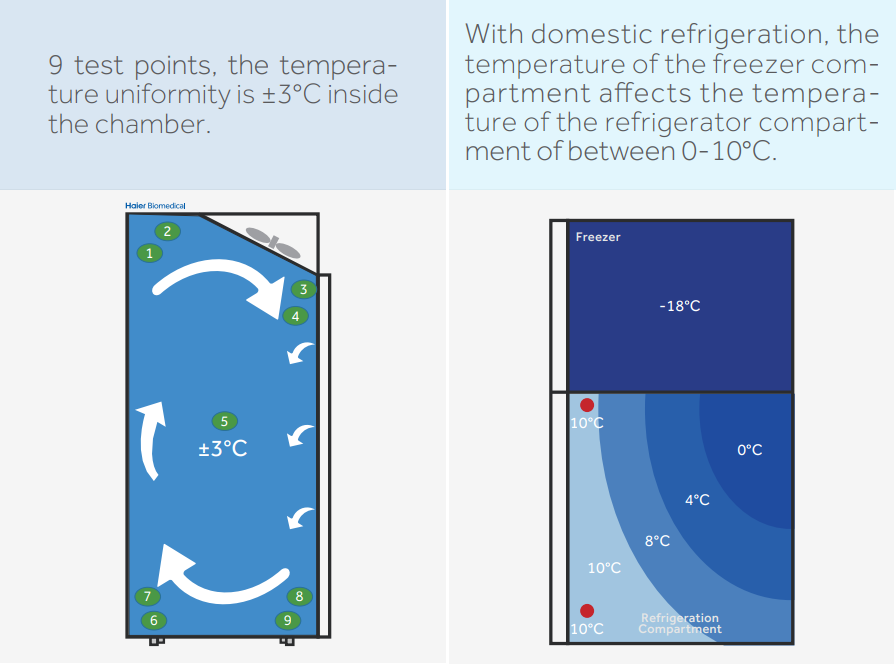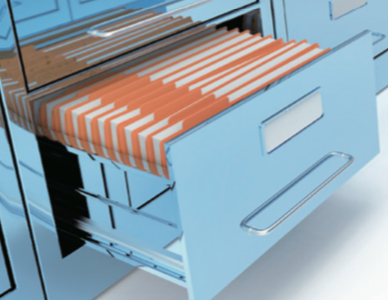A pharmaceutical refrigerator refers to a medical refrigerator that stores important biological and chemical reagents such as medicines, vaccines, reagents, enzymes as key examples. Due to its strict temperature control, the pharmaceutical refrigerator use is quite different from a domestic refrigerator. However, in many institutions, domestic refrigerators are still used to store valuable medicines and reagents.
According to a study by the US National Institute of Standards and Technology (NIST), domestic refrigerators cannot maintain proper storage temperatures compared to pharmaceutical refrigerators. Many governments, CDCs, hospitals, and other medical institutions' vaccine storage and handling guidelines recommend practitioners to buy pharmaceutical refrigerators instead of domestic refrigerators. Since the price of a pharmaceutical refrigerator is generally higher than that of a domestic refrigerator, you may be wondering why it is a necessary choice? What are the advantages of pharmaceutical refrigerators?
More precise temperature control, better temperature uniformity

The temperature in a domestic refrigerator fluctuates and the temperature uniformity in the cabinet is not good enough, which can easily lead to sample freezing or damage caused by increase or decrease in temperatures. The storage of samples such as reagents, vaccines, and medical drugs requires a constant temperature to ensure that they do not deteriorate. This places high requirements on the temperature control of the pharmaceutical refrigerator. Advanced pharmaceutical refrigerators adopt a 9-point temperature test and can accurately control the temperature within the range of 2~8°C, with an accuracy of 0.1°C and temperature uniformity of ±3°C inside the chamber, ensuring a safe, secure, and reliable storage environment to protect the preservation quality of the samples.
More convenient auto defrosts
Many domestic refrigerators are direct cool refrigerators, which are easy to frost because the air is not convective. The temperature change caused by frost may further affect the quality of the sample. Pharmaceutical refrigerators are air cool refrigerators, and the circulating fan and air duct can ensure the circulating flow of cold air and thus automatically defrosts.

Superior energy-saving performance
Most domestic refrigerators on the market use HFC refrigerants as long-term transitional refrigerants. Although they have no destructive effect on the ozone layer, the greenhouse effect is relatively large. Advanced pharmaceutical refrigerators use hydrocarbon refrigerants, which do not destroy the ozone layer at all, and the greenhouse effect is almost zero. The environmental protection effect is far better than that of HFC refrigerants, and the refrigeration efficiency is increased by more than 30% compared with HFC refrigerants.
Safer system guarantee
Domestic refrigerators cannot send out alarms when they break down, while pharmaceutical refrigerators usually incorporate a complete temperature alarm system with multiple sensors and mechanical temperature controllers. The system can issue audible and visual warnings for abnormal temperatures, sensor errors, and power failures, and even give remote or SMS warnings. In addition, pharmaceutical refrigerators generally have a safe door lock design and multiple password protection to prevent unauthorized access to ensure sample and medicines safety.

Smarter data storage
Domestic refrigerators do not have network services, let alone data storage. In contrast, pharmaceutical refrigerators can store hundreds of millions of scientific research and sample information in cloud servers for more than 10 years to ensure the traceability of all information.

In addition, the inner and outer panels of pharmaceutical refrigerators are generally made of metal material, with a thicker foam layer, smart cool preservation effect, easier cleaning of the inner tank, and more corrosion resistance. The product is equipped with test holes that are not available in domestic refrigerators, which is convenient for customers to connect all types of technical equipment to monitor the temperature inside the unit.














.png)


























